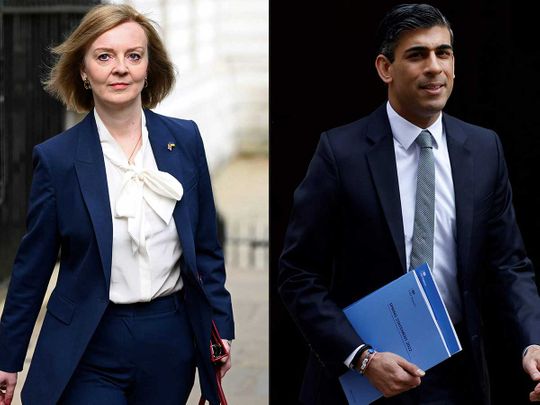
London: Britain will get a new prime minister next week, with either Foreign Secretary Liz Truss or former finance minister Rishi Sunak being announced on Monday as the next leader of the governing Conservative Party, and the next prime minister.
The following outlines the handover of power between outgoing Prime Minister Boris Johnson and the winner.
THE ANNOUNCEMENT
The results of the Conservative Party leadership contest will be announced at 12:30 p.m. (1130 GMT) on Monday Sept. 5.
HOW THE HANDOVER TAKES PLACE
On Tuesday Sept. 6, in a break with tradition, the appointment of the new prime minister will take place at Balmoral Castle in Scotland, where Queen Elizabeth spends her summers, rather than at Buckingham Palace in London.
The 96-year-old monarch has had to scale back her public appearances this year due to episodic mobility issues, and will not travel to London.
Johnson is first expected to make a statement outside Downing Street early on Tuesday morning before travelling to Scotland to tender his resignation to the queen, expected at around midday.
Either Truss or Sunak will then meet with the queen and be asked to form a government.
Once the new prime minister has been appointed, the Court Circular, the official record of royal engagements, will record that “the prime minister kissed hands on appointment”.
Queen Elizabeth has had 14 prime ministers during her 70-year reign.
NEW GOVERNMENT
Truss or Sunak will fly back to London to deliver a speech outside Downing Street, expected at around 4 p.m. (1500 GMT).
The new prime minister will then appoint a cabinet.
The new team of ministers will meet early on Wednesday before the prime minister arrives in the House of Commons chamber at noon (1100 GMT) for their first head-to-head Prime Minister’s Question Time with the leader of the opposition Labour Party, Keir Starmer.
What will the next UK leader inherit?
Britain’s next prime minister - who will be announced on Monday - will inherit an economy that is forecast to go into a long recession later this year with inflation at a 40-year high and limits on the options for getting growth going again.
Following is a summary of the key issues facing either Liz Truss, Britain’s foreign minister, or her rival in the Conservative Party’s leadership race, former finance minister Rishi Sunak.
INFLATION
At 10.1% in July, Britain had the highest rate of annual inflation among Group of Seven advanced economies. Forecasters expect inflation in Britain to climb higher with Goldman Sachs saying it could top 20% if gas prices do not fall.
High dependency on imported gas and a fast-weakening currency explain much of the strength in British inflation.
The pound has fallen almost 8% against the dollar in the last three months alone - a worse performance than the euro or even the Japanese yen - making imports of energy priced in dollars even more expensive.
TIGHT LABOUR MARKET
The Bank of England is also worried about domestically generated inflation pressure coming from a tight labour market, where shortages of staff following Brexit and the COVID-19 pandemic are in some cases pushing up pay sharply.
Official data show 188,000 fewer EU workers in Britain than two years ago, while the number of people listed as inactive because of long-term sickness rose to a 19-year high of 2.39 million in June, up about 300,000 since before the pandemic.
However, there are some signs of a cooling in demand for workers. Job vacancies, which hit a record high of 1.3 million April, have started to decline while the number of unemployed people ticked up in June for the first time in 17 months.
TAX CUTS? SPENDING STIMULUS?
Truss has promised to cut taxes, starting with a reversal of an increase in social security contributions and a suspension of so-called green levies on power bills. Economists have warned that a big injection of money into the pockets of consumers could worsen Britain’s inflation problem. Sunak proposes targetted support for lower-income households through higher welfare spending, an idea that Truss initially dismissed as “handouts” but one she has recently adopted.
As well as the risk of feeding inflation, tax cuts of higher spending would put further strain on Britain’s budget deficit at a time when public debt is close to 100% of economic output.
NO BANK OF ENGLAND RESCUE
Normally, a central bank forecasting a recession would cut interest rates but the BoE has other worries, chiefly the risk that the surge in inflation creates a wage-price spiral that could drag on the economy for years. Markets expect the BoE to take Bank Rate above 4% next year from 1.75% now. Most economists see a lower peak. The BoE also plans to start selling some of the bonds that it bought since the global financial crisis of 2007-08, another form of monetary policy tightening.











